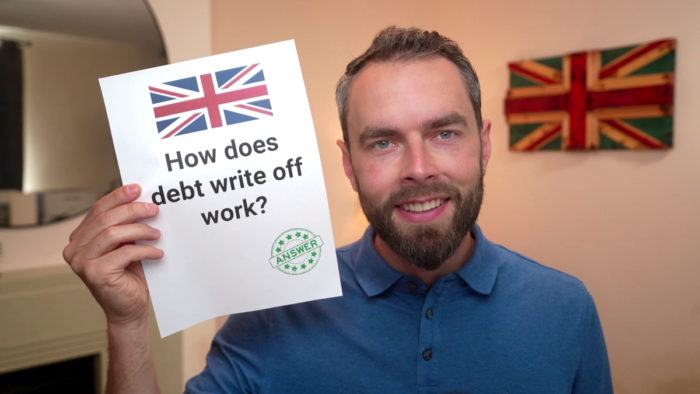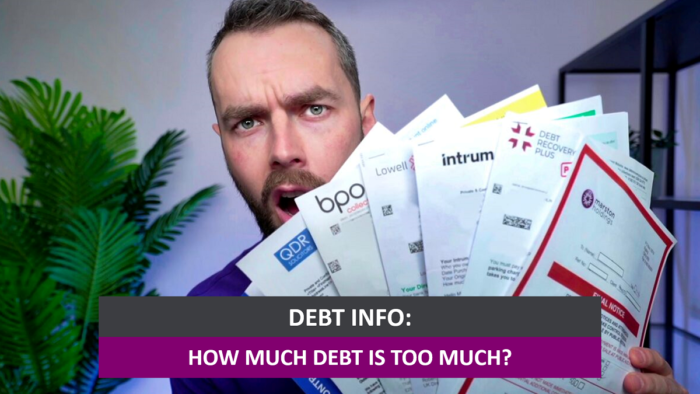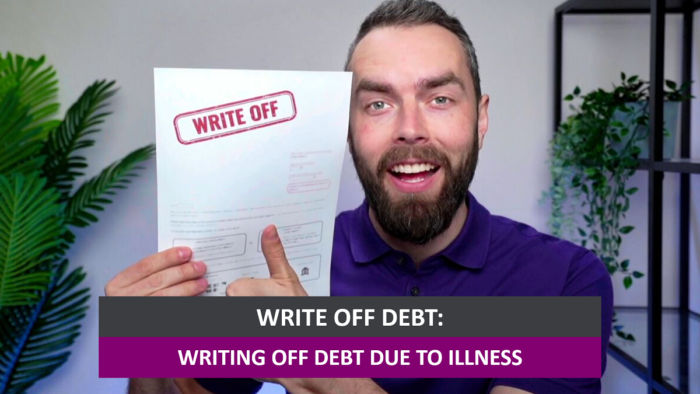How Does Debt Write Off Work?
For free & impartial money advice you can visit MoneyHelper. We work with The Debt Advice Service who provide information about your options. This isn’t a full fact-find, some debt solutions may not be suitable in all circumstances, ongoing fees might apply & your credit rating may be affected.

For free & impartial money advice you can visit MoneyHelper. We work with The Debt Advice Service who provide information about your options. This isn’t a full fact-find, some debt solutions may not be suitable in all circumstances, ongoing fees might apply & your credit rating may be affected.
Are you struggling to pay a debt? It can be a real worry, but remember, you’re not on your own. Every month, more than 170,000 people come to us for advice on their debt issues.
In this easy-to-understand guide, we’ll explain:
- What a debt write-off is.
- How a debt can be written off.
- The impact of writing off your debt on your credit rating.
- How to ask for a debt write-off.
- The time it takes for a debt to be written off.
We know that dealing with money problems can be stressful, but we’re here to help. Whether your debt is big or small, old or new, we’ll guide you through your choices. We’ll also share how your debt could be written off and whether this will show on your credit report.
We all find ourselves in tough spots now and then. We’ve been there too, which is why we understand and are here to support you.
Let’s discover more about writing off debt.
How can you get debt forgiven?
Writing off debt or debt forgiveness is sometimes the only way to get some financial relief. There are several debt solutions that will write off part or even eliminate debt.
One of the most simple ways for a debt to be written off is through age. If you have not acknowledged your debt for six years after your last payment, it becomes statute-barred.
A statute-barred debt is not enforceable. This means that there is no way for your creditor to force you to pay, even if they took you to court. Your debt will not technically be written off as it still exists, but you do not have to pay it.
You may be able to write off some debt by asking your creditors. You could offer to pay a lump sum with your creditor wiping off any remaining debt, or asking for reduced payments.
Negotiating with creditors can feel scary, but explaining your financial situation and making a suggestion for a payment plan might be enough to stop them from escalating the situation.
Keep in mind that reduced payments will affect your credit rating – even if your creditor agrees to the new plan. You may also find that your creditors will only accept reduced payments for a few months if they accept your offer at all!
If you are still unable to write off your debts, you may need to use a debt solution.
From my experience, these processes are complicated and will have serious impacts on your financial life. You’ll benefit from some advice and talking through your options to find out what would be best for you.
Contact any of these organisations for free debt advice:
What is a write-off?
A debt write-off is when a creditor agrees that you no longer have to repay your debt. The creditor may agree that you don’t have to repay if you can prove you are experiencing financial difficulty and have no viable way to repay.
You will probably find that your creditors are more likely to accept a new debt agreement if the amount you owe is small, or if your communication with creditors has been consistent.
While you can ask for debt cancellation, no creditor has an obligation to accept your suggestions. They could instead choose to keep chasing you for the money or try to get a County Court Judgment (CCJ) and pursue debt enforcement action, such as using bailiffs.
Learn how to improve your chances of getting a debt written off and download our free letter template to make your request easier. If you have debts you want to write off, you should hear this!
How does it work?
Debt write-off works by you (the debtor) simply asking your creditor to write off the debt you owe. This can be done over the phone or in writing.
You need to be a bit realistic about the chances of debt write-offs by asking your creditors nicely. Explaining your situation and any temporary financial issues that you have might be enough to convince your creditors that this is the best way for them to get their money back.
While some will accept new terms or reduced payments, many will still want you to pay back what you owe so you may need to look at alternatives or seek advice. You also need to be aware that reduced payments or a pause in repayments will have a negative impact on your credit score.
Debt write-offs can also happen as a result of a debt solution. A debt solution may be the best way for you to write off some of your debts, without dealing with all of the consequences of debt cancellation on your own.
How a debt solution could help
Some debt solutions can:
- Stop nasty calls from creditors
- Freeze interest and charges
- Reduce your monthly payments
A few debt solutions can even result in writing off some of your debt.
Here’s an example:
Situation
| Monthly income | £2,504 |
| Monthly expenses | £2,345 |
| Total debt | £32,049 |
Monthly debt repayments
| Before | £587 |
| After | £158 |
£429 reduction in monthly payments
If you want to learn what debt solutions are available to you, click the button below to get started.
Ask for debt forgiveness with our free letter template
Finding the right words to ask for a debt write-off can be difficult, which is why MoneyNerd has made it easier. I have created a free letter template asking for a debt write-off in a professional way.
You can download this letter template here and simply add your own details. Send it off with your monthly budget to improve your chances of getting your debt wiped.
Can you really get it done?
It is possible for you to get your debts written off by the creditor. However, it is rare for a creditor to agree to write off your debts, especially if you are not a vulnerable person and owe a significant amount.
To maximise your chances of getting your debts written off, you should provide them with a detailed monthly budget that illustrates your inability to make repayments. If they still reject your request, you may want to offer the creditor a token £1 monthly payment until your financial situation improves.
The more likely way to get a debt written off is when it becomes too old to be collected as per The Limitations Act and is officially known as statute-barred debt. Read on for more information on debt that is too old to be recovered by the creditor.
How long before the debt gets cleared?
Many debts become legally unenforceable after six years or after five years in Scotland. As long as you have not made a payment towards your debt or acknowledged that you owe the debt during this time, the debt becomes unenforceable and you do not have to pay. This is known as a statute-barred debt.
After this time limit, your creditor cannot do anything to make you pay.
However, there are some types of debt that do not have this limitation period. Any debts owed to HMRC, for example, can be chased even if they are decades old.
One other exception to the ageing out of debt is if your creditor has already issued a County Court Judgement (CCJ) against you. Once a CCJ has been obtained, this debt will never become statute-barred.
Once a debt becomes statute-barred, the creditor should not chase you for any more payments. If they ask you for a payment, you can reply to let them know the debt has become too old to be collected and you will not be making any payments. Always get confirmation that a debt is in fact statute barred first. You can get clarification from a debt charity, such as StepChange.
If they continue to chase you for payment, you could report them to the Financial Ombudsman Service.
What happens next?
When a debt is written off you no longer have to repay the debt. But that doesn’t mean the debt simply disappears. The debt will be recorded as unpaid or partially paid on your credit file. This is the case whether you get a debt write-off from the creditor or whether the debt becomes statute barred.
» TAKE ACTION NOW: Fill out the short debt form
Does it affect your credit rating?
Writing off debt will negatively affect your credit score. When you write off a debt, the credit is recorded as only partially repaid on your credit file and your credit score is reduced. This will make it difficult to get approved for further credit in the future until the record drops off your file (after six years) or your credit score improves.
Your Options for Dealing with Debt
If you can’t manage your debts on your own, you can use a debt solution to help get your finances under control.
Some debt solutions will write off some of your debt after you have made contributions for an agreed length of time.
1. Individual Voluntary Arrangement (IVA)
An Individual Voluntary Arrangement is a debt solution available outside of Scotland for people with multiple debts.
It is a legally binding agreement for you to make a single payment that gets split between creditors for a typical period of five years. At the end of this period, all remaining unsecured debt is written off.
Keep in mind that only unsecured debts can be included in an IVA – so you can get an IVA for credit card debt, but you can’t have your IVA cover your mortgage or your car payment. You will also have quite limited control over your money.
The fees for an IVA and minimum monthly payments can mean that this is not the best option for some people.
2. Debt Relief Order (DRO)
If an IVA is not for you, you could consider a Debt Relief Order (DRO). From my experience, this debt solution can work best for people with little monthly disposable income and no valuable assets.
A DRO will stop your creditors from contacting you or taking further action against you for a year after approval. If your financial situation has not improved after these 12 months, all debts that were part of your DRO will be written off.
If your finances improve during your DRO, you will need to notify your DRO officer. An increase in disposable income by £75 can be enough to end your DRO as you will no longer qualify. This means that you will need to repay your debts.
3. Protected Trust Deed (Scotland Only)
If you are in Scotland, you could get a Protected Trust Deed.
A Protected Trust Deed requires you and your creditors to agree to a payment plan. After the agreed period, any remaining debts are written off.
During the Trust Deed period, you will not own any of your assets as ownership will be moved to your trustee. Your trustee will help organise repayments and look at your finances to see what you can afford.
Once your creditors are happy with the terms of this agreement, it is ‘protected’ and they cannot make any changes or try to recover any more debt from you.
4. Bankruptcy
If you cannot pay back any of your debts and your debts are more than the value of everything that you own, you may have to declare bankruptcy.
Bankruptcy will write off most types of debt, including:
- Credit cards
- Store cards
- Overdrafts
- Utility arrears.
If your bankruptcy application is approved, your bankruptcy period will last 12 months. Your bank accounts will be frozen and you may have to sell your home or car to cover some of your debts.
You will need to make regular contributions towards paying off your debts during these 12 months if you have some disposable income. Once your bankruptcy term is over, your debts are written off.
Bankruptcy is a serious financial situation that can have serious financial implications. There are also some debts which can’t be written off using bankruptcy, including court fines and child maintenance arrears.
So, if you are considering bankruptcy, I recommend that you speak to a specialist who can walk you through your options.
Thousands have already tackled their debt
Every day our partners, The Debt Advice Service, help people find out whether they can lower their repayments and finally tackle or write off some of their debt.

Natasha
I’d recommend this firm to anyone struggling with debt – my mind has been put to rest, all is getting sorted.
Reviews shown are for The Debt Advice Service.
Get further help tackling your debts
Unlock further help tackling your debts and more information about wiping your debt here at MoneyNerd. We have lots more information to share with you about getting out of debt. And don’t forget to seek free debt support from a charity that can advise you on the most appropriate debt solution for your circumstances.




